Attached files
| file | filename |
|---|---|
| 8-K - FORM 8-K - DELCATH SYSTEMS, INC. | d301979d8k.htm |
 Exhibit 99.1 |
 2
DELCATH SYSTEMS, INC
Forward-looking Statements
This
presentation
contains
forward-looking
statements,
within
the
meaning
of
federal
securities
laws,
related
to
future
events
and
future
financial
performance
which
include
statements
about
our
expectations,
beliefs,
plans,
objectives,
intentions,
goals,
strategies,
assumptions
and
other
statements
that
are
not
historical
facts.
Forward-looking
statements
are
subject
to
known
and
unknown
risks
and
uncertainties
and
are
based
on
potentially
inaccurate
assumptions,
which
could
cause
actual
results
to
differ
materially
from
expected
results,
performance
or
achievements
expressed
or
implied
by
statements
made
herein.
Our
actual
results
could
differ
materially
from
those
anticipated
in
forward-
looking
statements
for
many
reasons,
including,
but
not
limited
to;
uncertainties
relating
to
the
time
required
to
build
inventory
and
establish
commercial
operations
in
Europe,
CE
Marking
for
the
Generation
Two
CHEMOSAT
system,
adoption,
use
and
resulting
sales,
if
any,
for
the
CHEMOSAT
system
in
the
EEA,
our
ability
to
successfully
commercialize
the
CHEMOSAT
system
and
the
potential
of
the
system
as
a
treatment
for
patients
with
cancer
in
the
liver,
availability
of
melphalan
in
the
EEA,
acceptability
of
the
Phase
III
clinical
trial
data
by
the
FDA,
our
ability
to
address
the
issues
raised
in
the
Refusal
to
File
letter
received
from
the
FDA
and
the
timing
of
our
re-submission
of
our
NDA,
re-
submission
and
acceptance
of
the
Company’s
NDA
by
the
FDA,
approval
of
the
Company’s
NDA
for
the
treatment
of
metastatic
melanoma
to
the
liver,
adoption,
use
and
resulting
sales,
if
any,
in
the
United
States,
approval
of
the
current
or
future
chemosaturation
system
for
other
indications
or
the
same
indication
in
other
foreign
markets,
actions
by
the
FDA
or
other
foreign
regulatory
agencies,
our
ability
to
successfully
enter
into
distribution
and
strategic
partnership
agreements
in
foreign
markets
and
the
corresponding
revenue
associated
with
such
foreign
markets,
our
ability
to
secure
reimbursement
for
the
chemosaturation
system,
progress
of
our
research
and
development
programs
and
results
of
future
clinical
trials,
uncertainties
regarding
our
ability
to
obtain
financial
and
other
resources
for
any
research,
development
and
commercialization
activities,
overall
economic
conditions
and
other
factors
described
in
our
filings
with
the
Securities
and
Exchange
Commission
including
the
section
entitled
‘‘Risk
Factors’’
in
our
most
recent
Annual
Report
on
Form
10-K
and
our
Reports
on
Form
10-Q
and
Form
8-K. |
 3
DELCATH SYSTEMS, INC
Delcath Systems –
Company Highlights
•
A specialty pharmaceutical and medical device company focused on
oncology
•
Initial focus on delivering high dose chemotherapy to improve disease
control of cancers in the liver
•
CHEMOSAT CE Mark approved –
indication permits broad use in liver
cancers. Commenced initial treatment procedures in Europe
•
Addressing potential multi-billion dollar European market opportunity
•
Unique device/drug product with statistically significant clinical trial
results
•
Seeking regulatory approval in multiple international markets
•
Intend to file US NDA in 2Q2012 seeking initial indication for metastatic
melanoma to the liver
•
IP and orphan drug designations create competitive barriers
Concentrating the Power of Chemotherapy for Disease Control in the Liver
|
 4
DELCATH SYSTEMS, INC
What is CHEMOSAT
Concentrating the Power of Chemotherapy for Disease Control in the Liver
|
 5
DELCATH SYSTEMS, INC
Initial Focus on Cancers of the Liver
•
Few effective therapies are available for cancers of the liver
Large patient population diagnosed annually with primary or metastatic liver
cancer
The liver is often the life limiting organ for cancer patients and one of the
leading causes of cancer death
Prognosis after liver involvement is poor
•
Multi-billion dollar annual global revenue market opportunity
•
CHEMOSAT is uniquely positioned to treat the entire liver as
standalone or complementary therapy
Major Global Unmet Medical Need and Significant Market Opportunity
|
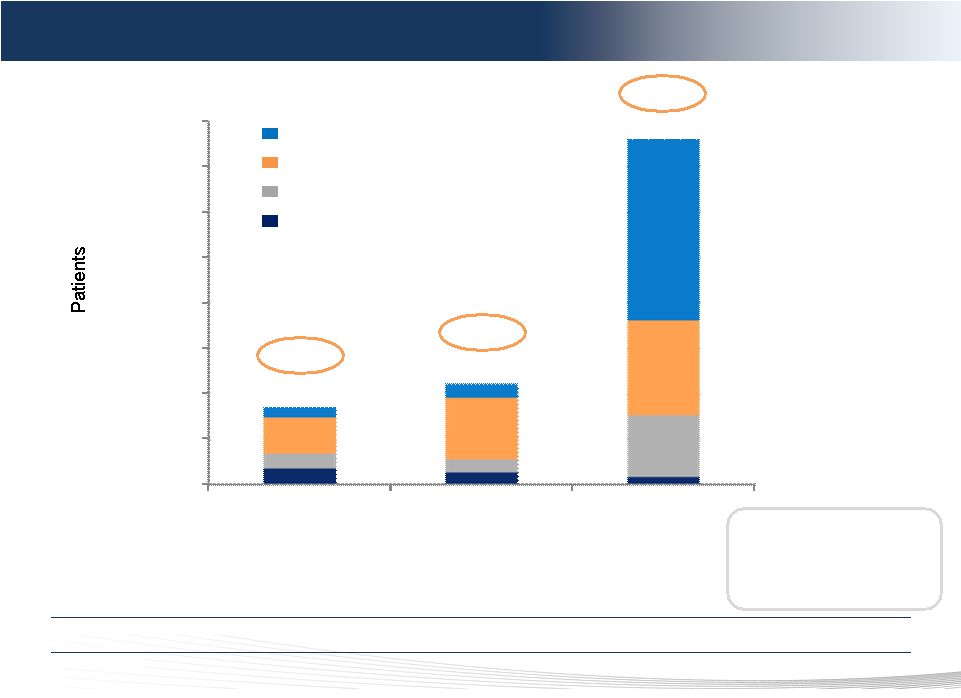 6
DELCATH SYSTEMS, INC
0
25000
50000
75000
100000
125000
150000
175000
200000
USA
EU
APAC
8,708
6,563
4,085
8,212
7,202
33,966
19,861
33,953
52,143
5,585
7,671
99,749
HCC
CRC
NET
Melanoma
CHEMOSAT Addresses Potential Multi-Billion Dollar Market
*TPM for initial U.S. labeled indication only
Estimated $7 Billion Annual Global Revenue Opportunity, Near Term Primarily in
Europe EU: Initial target countries of Germany, UK, Italy, France, Spain,
Netherlands, Ireland APAC: Initial target countries of China, Japan, S.
Korea, Taiwan, Australia Sources: LEK Consulting, GLOBOCAN, Company
estimates 55,389
$2.1 Bn
8,708*
$2.6 Bn
189,943
$2.3 Bn
1.
Assumes 2.5 treatments
per patient
2.
Assumes EU ASP of
$15K; US ASP of $25K;
APAC ASP of $5K |
 7
DELCATH SYSTEMS, INC
CHEMOSAT European Commercialization
•
CE Mark covers 30 countries in Europe
•
Focus on top 6 countries (DE, UK, FR, IT, SP, NL) and Ireland
•
Broad indication is for “percutaneous intra-arterial delivery of a
chemotherapeutic agent (melphalan hydrochloride) to the liver”
•
Melphalan for injection approved in 14 countries and
commercially available
•
Hospitals procure melphalan separately from existing sources
•
EU headquarters in Galway, Ireland
•
Direct and indirect selling channels
•
Push and pull marketing strategy
Large European Market Opportunity Concentrated in Target Countries
|
 8
DELCATH SYSTEMS, INC
CHEMOSAT Training and Marketing Commenced in Europe
Continue Training And Marketing Centers Roll-Out
•
Entered training and marketing agreements with leading
cancer centers in Europe
o
Institute of European Oncology (IEO), Milan, Italy
o
Johann Wolfgang Goethe (JWG) University Hospital, Frankfurt,
Germany
•
Training completed and first patients treated at IEO
o
Ocular melanoma and Gastric cancer liver mets
•
Agreements with additional leading cancer centers expected in
France, UK, Spain, the Netherlands, and Ireland in 1H2012
•
Expect training and patient treatments in JWG University Hospital,
Frankfurt, Germany in February |
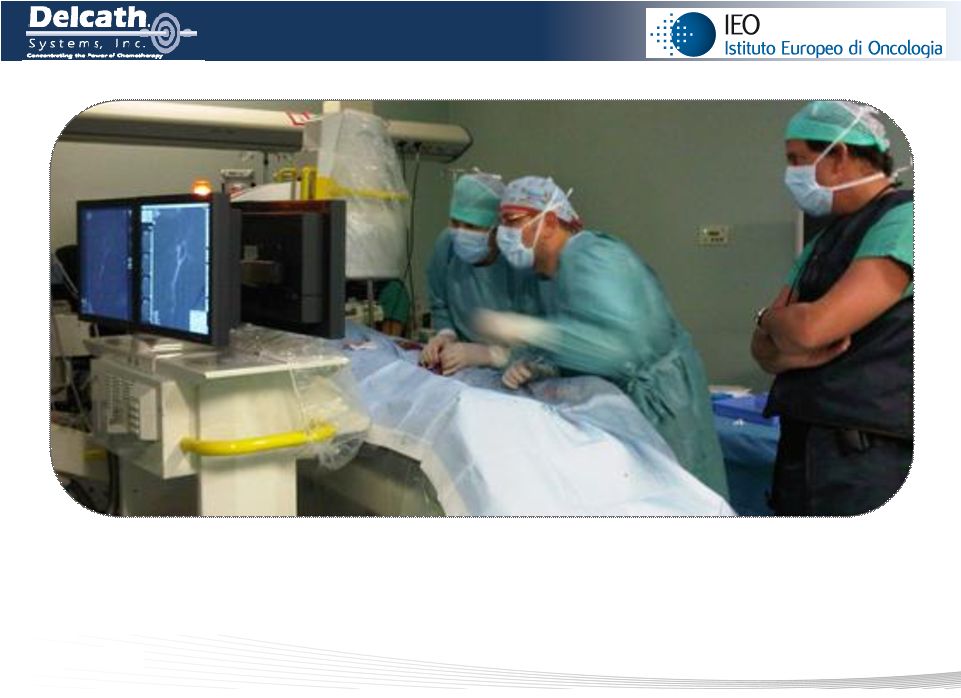 9
DELCATH SYSTEMS, INC
Team
at
Institute
of
European
Oncology
Performs
1
EU
CHEMOSAT
Procedure
January 31, 2012
st |
 10
DELCATH SYSTEMS, INC
Existing Liver Cancer Treatments Have Limitations
Unmet Medical Need Exists for More Effective Liver Cancer Treatments
Treatment
Advantages
Disadvantages
Systemic
–
Non-invasive
–
Repeatable
–
Systemic toxicities
–
Limited efficacy in liver
Regional
(e.g., IHP)
–
Therapeutic effect
–
Targeted
–
Invasive/limited repeatability
–
Multiple treatments are
required, not possible
Focal
(e.g. surgery, radioembolization
or SIRT, chemoembolization or
TACE, radio frequency ablation or
RFA)
–
Partial removal or
treatment of tumors
–
80-90% unresectable
–
Invasive and/or limited
repeatability
–
Treatment is limited by
tumor size, number of
lesions and location
–
“See a tumor, treat a tumor” |
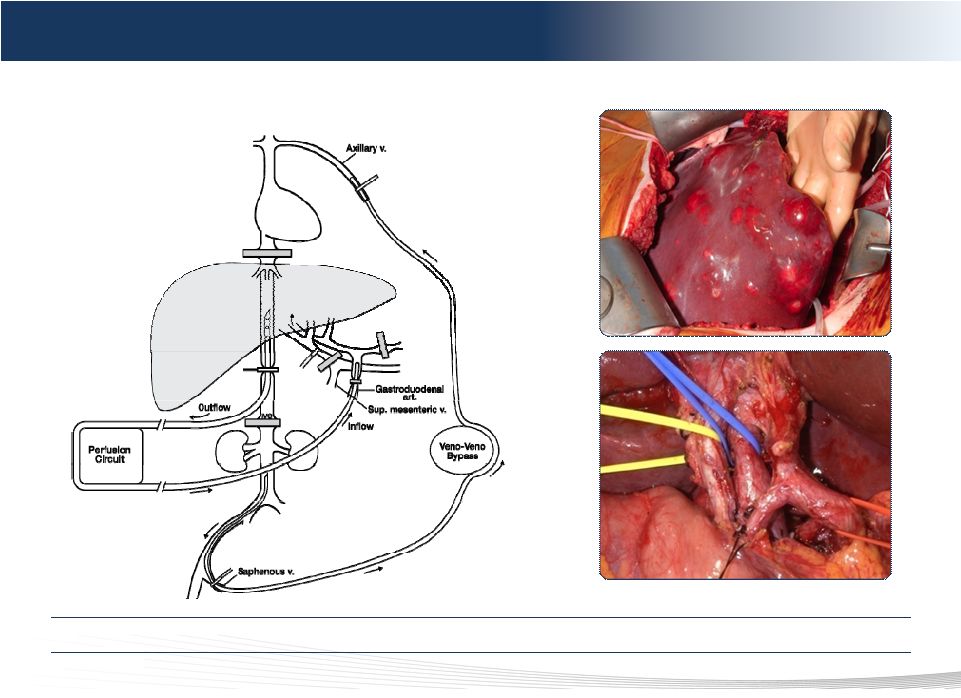 11
DELCATH SYSTEMS, INC
CHEMOSAT System –
Where It All Began
Open Surgical IHP
Isolated Hepatic Perfusion: Proof of Concept, but High Morbidity and Non-Repeatable |
 12
DELCATH SYSTEMS, INC
The Delcath CHEMOSAT System
Three Steps
1)
ISOLATION
2)
SATURATION
3)
FILTRATION
Advantages
•
No more open surgery
•
Minimally invasive, repeatable
•
Treats entire liver (macro and micro)
•
Allows for over 100x effective dose
escalation of drug agents at tumor
site
•
Improved disease control in the liver
•
Minimizes systemic toxicities
•
Complements systemic therapy
Minimally Invasive, Repeatable Liver Procedure That Could Complement Systemic
Therapy Note: Image not to scale. |
 13
DELCATH SYSTEMS, INC
Melphalan Dosing & Background
•
Well understood, dose dependant, tumor preferential, alkylating cytotoxic agent
that demonstrates little to no hepatic toxicity
•
Manageable systemic toxicities associated with Neutropenia and
Thromboytopenia •
Drug dosing 12x higher than FDA-approved dose via systemic IV
chemotherapy •
Dose delivered to tumor is over 100x higher than that of systemic IV
chemotherapy Type
Dosing (mg/kg)
Multiple Myeloma (label)
0.25
Chemoembolization
0.62
Surgical Isolated Hepatic Perfusion (IHP)
1.50
Myeloablation
2.50-3.50
Chemosaturation (PHP)
3.00
An Established Drug For Liver Cancer Therapy |
 14
DELCATH SYSTEMS, INC
What CHEMOSAT Offers
Patients:
o
Significant improvement in disease control in the liver compared
to
standard of care in patients with unresectable hepatic tumors (primary
and metastatic)
o
Manageable systemic toxicities
o
Time, so that primary cancers can continue to be treated
Physicians:
o
Novel, targeted liver cancer treatment to complement
other
cancer therapies
o
Repeatable, percutaneous procedure
o
Ability to treat the entire liver, including both visible and micro tumors
o
Ability to continue treating patients for extra-hepatic disease
Compelling Clinical Outcomes and Value Proposition |
 Current Patient Referral Path
Diagnosis
of Cancer
15
DELCATH SYSTEMS, INC
Transferred for
chemosaturation
Identification of liver
involvement
with no
improvement from systemic
therapy
When liver disease is
controlled,
patients
return
to
the
Medical
Oncologist for additional systemic therapy
Patient
Primary
Care
Medical
Oncologist
Offers systemic therapy
Surgical
Oncologist
Offers resection or
other focal therapy
Interventional
Radiologist
Offers chemosaturation
procedure |
 16
DELCATH SYSTEMS, INC
Positive Phase III Results*
•
Primary endpoint exceeded, p value = 0.0001, hazard ratio of .35
o
Treatment arm shows 5x median hepatic progression free (hPFS) survival compared to
control arm o
CS/PHP median hPFS of 8.0 months compared to 1.6 months for BAC
o
86% overall clinical benefit (CR + PR + SD)
•
Secondary endpoints support results
o
OS Secondary endpoint –
No difference in Kaplan-Meier curves due to cross over treatment response (9.8
months compared to 9.9 months)
o
CS/PHP median overall PFS of 6.7 months vs 1.6 months for BAC
•
OS exploratory cohort analysis favorable
o
Median survival of 9.8 months for treatment arm compared to 4.1 months
non-crossover BAC patients o
Median survival of 11.4 months for all patients treated with melphalan, including
crossover o
9 CS/PHP-treated patients and 3 BAC-treated patients still alive as of
12/2011 •
Safety profile –
expected and consistent with currently approved labeling for
melphalan
o
30-day deaths on PHP: 3/44 patients (6.8%)
1 Neutropenic Sepsis (2.3%); 1 Hepatic Failure 2.5% (95% tumor burden); 1 gastric
perforation o
30-day deaths on BAC: 3/49 patients (6.1%)
Trial Outcomes Favorable and Consistent with Special Protocol Assessment
* Updated Investigator results presented at 2011 ECCO/ESMO Annual Meeting
|
 17
DELCATH SYSTEMS, INC
Phase 2 NCI Trial –
Metastatic Neuroendocrine (mNET) Cohort
Pre-CS
(Baseline)
Post-CS #2
(+4 Months)
Post-CS #1
(+6 Weeks)
Compelling Clinical Data in Attractive mNET Market
Phase 2 mNET Tumor Cohort (n=24)*
Number (n)
Primary Tumor Histology
Carcinoid
4
Pancreatic Islet Cell
20
Response
Not Evaluable (Toxicity, Incomplete Treatment, Orthotopic Liver
Transplantation)
4
Progressive Disease
2
Minor Response / Stable Disease
4
Partial
Response
(30.0%
-
99.0%
Tumor
Reduction)
13
Complete Response (No Evidence of Disease)
1
Objective Tumor Response
14
Objective Tumor Response Rate
70%
Duration (months)
Median Hepatic PFS
15.5
Overall Survival After CS
30.4
*Presentation at ECCO/ESMO 2011 annual meeting |
 18
DELCATH SYSTEMS, INC
Phase 2 NCI Trial –
HCC Cohort
•
Hepatocellular carcinoma (HCC) is the most common primary cancer
of
the liver, with approximately 749,000* new cases diagnosed worldwide
annually
•
Nine patients with tumors of hepatobiliary origin: five HCC patients and
four cholangiocarcinoma patients
•
Both groups received CHEMOSAT procedures and had positive efficacy
signals
•
The responses were especially encouraging in the HCC group and
consisted of confirmed partial response or durable stable disease
•
Safety profile –
expected and consistent with pivotal FDA Phase 3
melanoma trial
•
Plan to initiate HCC trials with CHEMOSAT in 2H2012
Encouraging Initial Positive Signal For Primary Liver Cancer
*Source: GLOBOCAN |
 19
DELCATH SYSTEMS, INC
Melphalan Efficacy for Metastatic Colorectal Cancer
•
Substantial clinical evidence of benefit of using melphalan to treat mCRC
via isolated hepatic perfusion (IHP) procedure
Over 800 patients treated in 15 studies since 1998
Patients treated only once
Median response rate of 47% (range 29%-76%)¹
•
Delcath Phase 2 NCI CHEMOSAT Trial –
mCRC Cohort
Challenges enrolling at NCI
16 patients treated since 2004
Inconclusive efficacy due to advanced disease status (generally 5
or 6
line)
Safety profile –
expected and consistent with pivotal FDA Phase 3 melanoma trial
•
Plan to initiate mCRC trial with CHEMOSAT melphalan in 2H2012
Strong Rationale For Using CHEMOSAT With Melphalan To Treat mCRC
1. van Iersel LB, Koopman M, Van D, V, et al. Ann Oncol.
2010;21:1662-7. th
th |
 20
DELCATH SYSTEMS, INC
Product Development Pipeline
•
Melanoma liver mets
•
Proprietary drug-melphalan &
CHEMOSAT
•
All liver cancers –
melphalan
•
Class III medical device
•
3
party melphalan
•
Gen 2 melphalan CE Mark
•
CHEMOSAT for additional drugs
•
CHEMOSAT for other organs (lung
and brain)
•
mCRC and HCC indications
Initial Opportunity
Near Term (< 5 years)
Intermediate Term (> 5 years)
•
Doxorubicin system CE Mark
•
mCRC and HCC clinical trials
•
CHEMOSAT for additional drugs
•
CHEMOSAT for other organs (lung
and brain)
•
CHEMOSAT (Melphalan) in S.
Korea, Japan
•
CHEMOSAT (Doxorubicin) in
China and Taiwan
•
3
party doxorubicin
•
CHEMOSAT for additional drugs
•
CHEMOSAT for other organs (lung
and brain)
•
CHEMOSAT (Melphalan) in
Australia and Hong Kong
•
3
party melphalan
Development Aligned to Address Significant Market Opportunity
rd
rd
rd |
 21
DELCATH SYSTEMS, INC
CHEMOSAT Doxorubicin Development
•
Multiple published phase I/II studies from MD Anderson Cancer Center
and Yale with percutaneous hepatic perfusion (PHP) and Kobe University
using doxorubicin show promising response rates for HCC*
•
STATUS:
o
First pass removal efficiency 95% in initial in vitro studies
o
Utilize new trade secret manufacturing process
o
Intend to file and seek CE Mark approval in 2H2012
o
Plan to use CHEMOSAT doxorubicin in Asia Phase III 2L
HCC trials
•
EXPECTED BENEFITS
o
Multiple treatments
o
Reduced systemic toxicity for improved safety profile
o
Concomitant Therapy (complements systemic therapies)
Addressing the Large HCC Market Opportunity in China
* See Appendix for list of studies |
 22
DELCATH SYSTEMS, INC
Clinical Development Program
•
Goal
Expand indications for HCC and mCRC with US registration trials
Generate robust clinical data to support commercialization
•
Potential 2012 clinical trials
HCC: Global Phase 2
randomized 1L
CHEMOSAT Melphalan vs. Sorafenib
HCC:
US registration –
Global Phase 3
randomized 2L CHEMOSAT Melphalan vs.
Best Supportive Care (BSC) for Sorafenib failure
HCC:
Asia Phase 3
randomized 2L
CHEMOSAT Doxorubicin vs.Best Supportive
Care (BSC) for Sorafenib failure
mCRC:
Global Phase 2
signal seeking/safety 2L
CHEMOSAT Melphalan
mCRC:
US registration –
Global Phase 3
randomized 2L CHEMOSAT Melphalan vs.
Approved Alternatives
•
US Expanded Access Program (EAP) for metastatic Melanoma
Establish CHEMOSAT As The Standard Of Care (SOC) For Disease Control In The
Liver |
 23
DELCATH SYSTEMS, INC
Generation Two CHEMOSAT Melphalan
STATUS:
•
Consistent first pass removal efficiency of 98% or better in both in
vitro and
pre-clinical GLP animal studies
•
New trade secret manufacturing process for filter medium
•
Filed for CE marking for Gen Two
•
Anticipate approval in 1Q2012
EXPECTED BENEFITS:
•
Reduced systemic toxicity
•
Concomitant Therapy (complements systemic therapies)
•
Increased utility in a wider range of patients
Gen Two Filter Has The Potential to
Enhance Procedure and Market Opportunity |
 24
DELCATH SYSTEMS, INC
European Commercialization Strategy
Strategy:
•
Focus efforts in Target Countries
•
8-10 leading EU cancer centers as initial training centers
•
Push and Pull marketing and selling strategy
•
Validate business model and demonstrate scalability
Tactics & Execution:
•
Educate medical oncologists via contract organization –
Medical Science Liaison (MSL)
•
Sell to hospital-based interventional radiologists, surgeons and C-suite
decision makers with combination of direct sales and distributors
•
Establish European patient education & awareness programs (PR, website)
•
Leverage existing new technology reimbursement channels, while pursuing permanent
procedure reimbursement via Health Technology Assessment (HTA)
•
Clinical trials to generate additional data for CRC and HCC to support revenue
ramp up Currently At Initial Launch Phase |
 25
DELCATH SYSTEMS, INC
European Reimbursement Considerations
•
No centralized pan-European medical device reimbursement body –
regional and national systems
•
Devices typically reimbursed under Diagnosis Related Groups (DRG)
as part of a procedure
•
Immediate reimbursement plans:
Utilize existing codes where permitted until permanent reimbursement
established (e.g. Italy)
Apply for funding under existing New Technology Payment programs
(e.g.
NUB in Germany and HAS in France)
Other oncology therapies currently reimbursed, despite lacking
randomized data
Reimbursement Mechanisms In Place To Support Commercial Launch
|
 26
DELCATH SYSTEMS, INC
European Interim New Technology Reimbursement Programs
Interim New Technology Payment Programs Already Exist in Major European
Markets |
 27
DELCATH SYSTEMS, INC
U.S. FDA Regulatory Status
•
Pre-NDA submission meeting with FDA conducted in January 2012
•
Satisfied with FDA response
•
Addressed RTF related issues
Manufacturing plant inspection timing
Product and sterilization validation
Additional statistical analysis clarification
Additional safety data
•
Continued progress in finalizing data entry and monitoring
Completed data migration to new FDA compliant database
Created new Case Report Form (CRF)
•
Plan to file NDA submission in Q2 2012
Progress On Track to Submit NDA |
 28
DELCATH SYSTEMS, INC
U.S. Commercialization Strategy
•
Initial focus on leading cancer centers and referring community hospitals
•
Educate Medical Oncologists via Contract Medical Science Liaison
(MSL)
•
Direct Strategy to sell to Interventional Radiologists and Surgeons: 12
Sales territories ultimately expanding to as many as 60 territories as
revenues ramp
•
5 Clinical Specialists initially to support site initiation and training
•
Utilize top centers from Phase III trial as Centers of Excellence for training
and support
Direct Sales Channels Supplemented With Contract MSLs
|
 29
DELCATH SYSTEMS, INC
U.S. Reimbursement Strategy
•
Intend to seek chemosaturation specific codes based upon value
proposition relative to other cancer therapies
Physician:
•
Use existing miscellaneous DRG procedure code
•
Apply for a CAT I code following FDA approval
Hospital:
•
Apply for new ICD-9/10 procedure code to capture full procedure
of hepatic isolation and chemosaturation
•
Request new DRG based on costs above those of existing DRGs
and clinical dissimilarity to other hepatic procedures in current
DRGs
Pursuing New Specific Codes For Chemosaturation Procedure
|
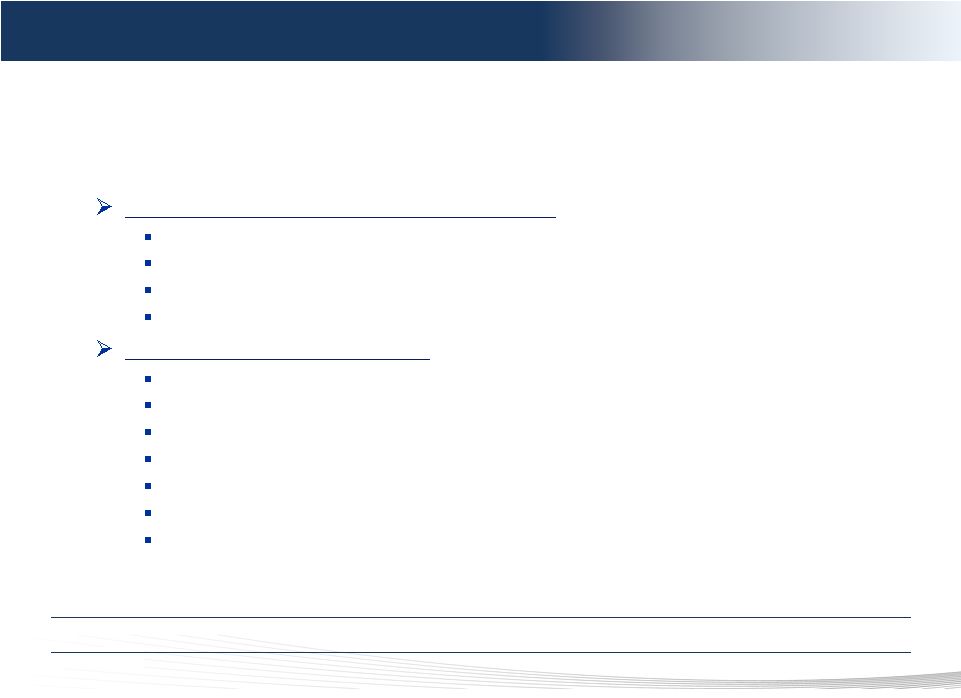 30
DELCATH SYSTEMS, INC
International Strategy beyond EU and US
•
Leverage CE Mark to obtain reciprocal regulatory approvals for
CHEMOSAT System in other international markets
•
International regulatory submissions status:
Application submitted, potential approval
Australia
-
2012
Hong Kong
-
2012
S. Korea
-
2013
Singapore
-
2013
Intend to submit applications
Israel
Canada
Mexico/Argentina/Brazil
Russia
India
Japan
China and Taiwan
•
Utilize 3
party melphalan and doxorubixin available to physicians
Combination of Strategic Partnerships and Specialty Distributors
rd |
 31
DELCATH SYSTEMS, INC
Intellectual Property
•
Patent Protection
o
7 issued U.S. patents, 10 foreign patents issued and 4 pending
o
Primary device patent set to expire August 2016
o
Up to 5 years of patent extension post FDA approval
•
Trade Secret Protection
o
Developed improved filter media via new manufacturing processes
•
FDA Protection
o
Orphan Drug Designation granted for melphalan in the treatment of ocular
melanoma, cutaneous melanoma and metastatic neuroendocrine tumors,
as well as for doxorubicin in the treatment of HCC
Provides 7 years of marketing exclusivity post FDA approval
o
Additional Orphan Drug applications to be filed for other drugs and
indications, including melphalan for HCC and CRC
Multiple Levels of Protection |
 32
DELCATH SYSTEMS, INC
Experienced Management Team
Executive
Title
Prior Affiliation(s)
Years of
Experience
Eamonn Hobbs
President and CEO
AngioDynamics, E-Z-EM
31
Graham Miao, Ph.D
EVP & CFO
D&B, Pagoda Pharma, Schering-
Plough, Pharmacia, JP Morgan
22
Krishna Kandarpa, M.D.,
Ph.D.
CMO and EVP, R&D
Harvard, MIT(HST), Cornell,
UMass
32
Agustin Gago
EVP, Global Sales & Marketing
AngioDynamics, E-Z-EM
30
Peter Graham, J.D.
EVP, General Counsel &
Global Human Resources
Bracco, E-Z-EM
17
David McDonald
EVP Business Development
AngioDynamics, RBC Capital
Markets
29
John Purpura
EVP, Regulatory Affairs & Quality
Assurance
E-Z-EM, Sanofi-Aventis
28
Harold Mapes
EVP, Global Operations
AngioDynamics, Mallinkrodt
26
Bill Appling
SVP Medical Device R&D
AngioDynamics
26
J. Chris Houchins
SVP, Clinical and Medical Affairs
Arno, Schering-Plough, Pfizer,
Pharmacia, GD Searle
21
Dan Johnston, Ph.D.
VP, Pharmaceutical R&D
Pfizer, Wyeth
11 |
 |
 34
DELCATH SYSTEMS, INC
Financial Update
•
Follow-On Offerings:
Raised ~ $94 million since November 2009
•
Financing Program:
$39.75 million At-The-Market (ATM) equity
offering program since December 29, 2011
•
Cash:
$30.8 million at December 31, 2011 (unaudited)
•
Burn Rate:
$40.1 million full year 2011 (unaudited)
•
Debt:
None
•
Shares Outstanding:
48 million (~55 million fully diluted*)
•
Institutional Ownership:
22% at December 31, 2011
•
Market Capitalization:
$ 204 million as of February 9, 2012
•
Avg. Daily Volume (3mo)
675,000
As of December 31, 2011 fully diluted includes an additional 4.1
million options at $5.09, 2.5 million warrants at
$3.51, and 193,532 unvested restricted shares.
|
 35
DELCATH SYSTEMS, INC
2012 Milestones
•
First patients treated with CHEMOSAT melphalan in Europe –
1Q
•
Execute contract for MSL services in EU –
1Q
•
Secure agreements with 6-8 leading cancer centers in EU –
1H
•
Obtain CE Mark for Gen 2 CHEMOSAT melphalan –
1Q
•
US NDA submission in 2Q 2012 and acceptance in 3Q 2012
•
Submission for publications of Phase 3 data and mNET arm of Phase 2
data –
2H
•
First patients enrolled in mCRC and HCC CHEMOSAT melphalan
studies, EAP –
2H
•
Submit and seek approval of CE Mark for CHEMOSAT doxorubicin –
2H
•
Potential Asia strategic partnership –
dedicated BD with China a top
priority |
 36
DELCATH SYSTEMS, INC
Appendices |
 37
DELCATH SYSTEMS, INC
Appendix I
CHEMOSAT Market Opportunity
by Disease and Target Counties |
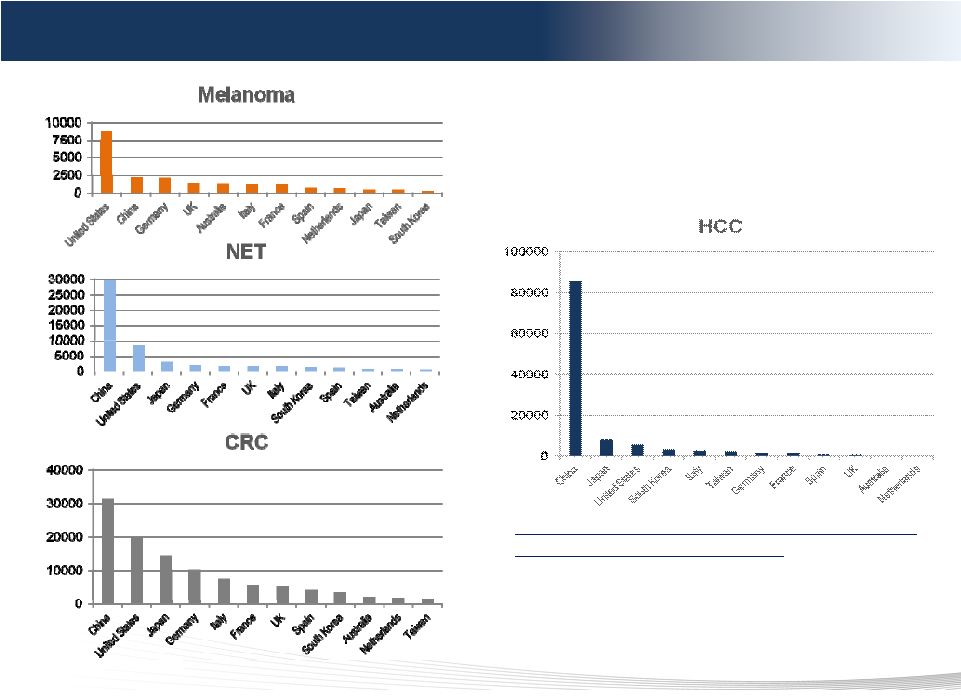 38
DELCATH SYSTEMS, INC
•
Europe –
Largest near-term opportunity
•
CRC –
Largest opportunity worldwide
•
Melanoma –
Largest opportunity is in US
•
China-
Largest opportunity for HCC
Market Opportunity by Disease (patients)
Market Opportunity defined as Total Potential
Market (TPM) for CHEMOSAT
®
1.Primary cancer incidence
2.Adjusted for predominant disease in the liver (primary
or metastatic cancer)
3.Adjusted
for
addressable
patients
via
Delcath
CHEMOSAT
®
Sources: LEK Consulting, GLOBOCAN, Company estimates
|
 39
DELCATH SYSTEMS, INC
Europe Market by Disease –
Device Only
Germany
(Direct)
UK
(Direct)
France
(Indirect)
Italy
(Indirect)
Spain
(Indirect)
Netherlands
(Direct)
Ireland
(Direct)
Total
Potential
(patients)
Potential
Market
($ MM)
1,2,3
Total Potential Market #Patients
Ocular
Melanoma
404
297
295
285
197
79
19
1,576
$ 62
Cutaneous
Melanoma
1,625
994
753
801
360
379
73
4,987
$ 206
CRC
9,902
5,300
5,475
7,281
4,016
1,644
335
33,953
$1,339
HCC
(Primary)
1,637
720
1,514
2,597
1,087
82
35
7,671
$277
NET
1,783
1,336
1,353
1,299
974
360
98
7,202
$ 281
TOTAL
15,351
8,647
9,389
12,263
6,634
2,545
560
55,389
$ 2,166
Europe Presents Significant Potential Market Opportunity
1.
Assumes 2.5 treatments per patient
2.
Assumes ASP of ~$15K USD
3.
Assumes mix of direct sales and distributors
Sources: LEK Consulting, GLOBOCAN, Company estimates |
 40
DELCATH SYSTEMS, INC
US Market by Disease –
Device and Drug Combination
Liver Metastasis
Potential Market
# Patients
Potential Market
# Procedures
Potential Market
($MM)**
Ocular
Melanoma
1,685
4,213
$ 105
Cutaneous
Melanoma
7,023
17,557
$ 439
TOTAL MELANOMA
(Initial Expected Label)
8,708
21,770
$ 544
CRC
19,861
49,653
$ 1,241
HCC (Primary)
5,586
13,964
$ 349
NET
8,212
20,530
$ 513
OTHER TOTAL
(Potential Label Expansion)
33,659
84,147
$ 2,104
TOTAL
42,367
105,917
$ 2,648
1.
Assume 2.5 treatments per patient
2.
Estimated ASP of $25K
Sources: LEK Consulting, GLOBOCAN, Company estimates |
 41
DELCATH SYSTEMS, INC
APAC Market by Disease
1.
Assume 2.5 treatments per patient
2.
Assume ASP of ~$5K
China
S. Korea
(Device)
Japan
(Device)
Taiwan
(Device)
Australia
(Device)
Total
Potential
(patients)
Potential
Market
($MM)
1,2
Total Potential Market #Patients
HCC
(Primary)
85,780
3,258
8,296
2,152
263
99,749
$ 1,156
Other
CRC
31,127
3,245
14,298
1,441
2,031
52,143
$ 642
NET
29,197
1,048
2,759
500
462
33,966
$ 393
Ocular
Melanoma
1,765
66
175
31
96
2,134
$ 25
Cutaneous
Melanoma
382
43
136
246
1,144
1,951
$ 23
OTHER
TOTAL
62,472
4,403
17,368
2,218
3,733
90,194
$ 1,083
TOTAL
148,104
7,661
25,665
4,370
3,996
189,943
$ 2,239
APAC Target Markets Represent over $2 Billion Potential Market Opportunity
Sources: LEK Consulting, GLOBOCAN, Company estimates
|
 42
DELCATH SYSTEMS, INC
Appendix II
CHEMOSAT melphalan for metastaic melanoma
Phase 3 Pivotal Trial Details |
 43
DELCATH SYSTEMS, INC
Phase III Clinical Trial Design
Randomized to CS
92 patients: ocular
or cutaneous melanoma
Best Alternative Care (BAC)
Investigator and patient decision
(any and all treatments)
CS/Melphalan
Treat every 4 weeks x 4 rounds
(responders
can receive up to 6 rounds)
Cross-over
Primary Trial Endpoint
•
Statistically significant difference in Hepatic Progression
Free Survival (“hPFS”): p < 0.05
•
Over 80% of Oncologic drugs approved by FDA between
2005 –
2007 on endpoints other than overall survival
Secondary Trial Endpoints
•
Hepatic response
and duration of hepatic response
•
Overall response
and duration of overall response
•
Overall
Survival
–
Diluted
by
Cross
Over
•
SAP calls for analysis of various patient cohorts
Pre-CS (Baseline)
Post-CS (22+ Months)
Hepatic Response –
Metastatic Melanoma
Fully Powered, 93 Patient, Randomized, Multi-Center NCI Led Study
CS = ChemoSaturation (CHEMOSAT) |
 44
DELCATH SYSTEMS, INC
Positive Phase III Results*
•
Primary endpoint exceeded, p value = 0.0001, hazard ratio of .35
o
Treatment arm shows 5x median hepatic progression free (hPFS) survival compared to
control arm o
CS/PHP median hPFS of 8.0 months compared to 1.6 months for BAC
o
86% overall clinical benefit (CR + PR + SD)
•
Secondary endpoints support results
o
OS
Secondary
endpoint
–
No
difference
in
Kaplan-Meier
curves
due
to
cross
over
treatment
response
(9.8
months compared to 9.9 months)
o
CS/PHP median overall PFS of 6.7 months vs 1.6 months for BAC
•
OS exploratory cohort analysis favorable
o
Median survival of 9.8 months for treatment arm compared to 4.1 months
non-crossover BAC patients o
Median survival of 11.4 months for all patients treated with melphalan, including
crossover o
9 CS/PHP-treated patients and 3 BAC-treated patients still alive as of
12/2011 •
Safety profile –
expected and consistent with currently approved labeling for
melphalan
o
30-day deaths on PHP: 3/44 patients (6.8%)
1 Neutropenic Sepsis (2.3%); 1 Hepatic Failure 2.5% (95% tumor burden); 1 gastric
perforation o
30-day deaths on BAC: 3/49 patients (6.1%)
Trial Outcomes Favorable and Consistent with Special Protocol Assessment
* Updated Investigator results presented at 2011 ECCO/ESMO Annual Meeting
|
 45
DELCATH SYSTEMS, INC
Phase 3 Hepatic Progression-free Survival (ITT)
Hazard Ratio: 0.35
(CI: 0.23-0.54)
0
5 10 15
20
25
30 35
Months
CS-PHP
BAC
8.0
1.6
p<0.0001
1.0
Survival probability
0.8
0.6
0.4
0.2
0.0
CS-PHP Demonstrated A 5x Improvement In Primary Endpoint of hPFS
|
 46
DELCATH SYSTEMS, INC
Phase 3 Overall Progression-free Survival (ITT)
Hazard Ratio: 0.36
(CI: 0.23-0.57)
0
5 10 15
20
25
30 35
Months
CS-PHP
BAC
6.7
1.6
p<0.0001
1.0
Survival probability
0.8
0.6
0.4
0.2
0.0
CS Also Demonstrated A Highly Statistically Significant Improvement In Overall
PFS |
 47
DELCATH SYSTEMS, INC
Phase 3 Overall Survival (ITT)
Hazard Ratio: 1.08
(CI: 0.69-1.68)
0
5 10 15
20
25
30 35
40 45 50 55
Months
CS-PHP
BAC
9.8
9.9
p=0.74
1.0
Survival probability
0.8
0.6
0.4
0.2
0.0
55% crossover
Overall Survival Confounded By Crossover Study Design
|
 48
DELCATH SYSTEMS, INC
Appendix III
Published Phase I/II Studies of
Doxorubicin with PHP (percutaneous hepatic
perfusion) For HCC |
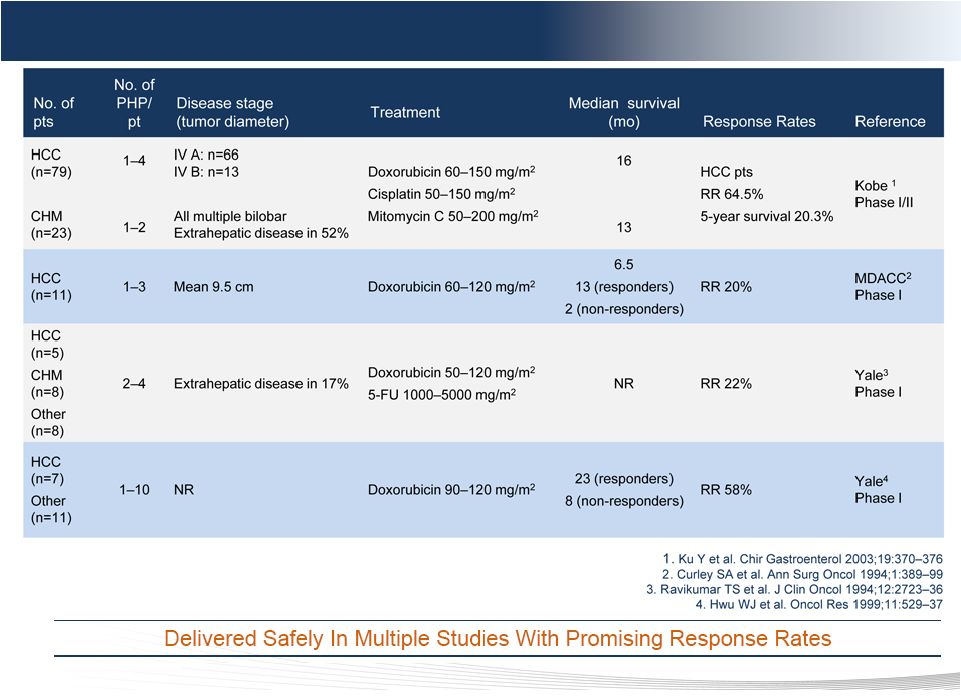 49
DELCATH SYSTEMS, INC
Phase I/II Studies of PHP-Doxorubicin For HCC |
 50
DELCATH SYSTEMS, INC
©
2011 DELCATH SYSTEMS, INC. ALL RIGHTS RESERVED |
